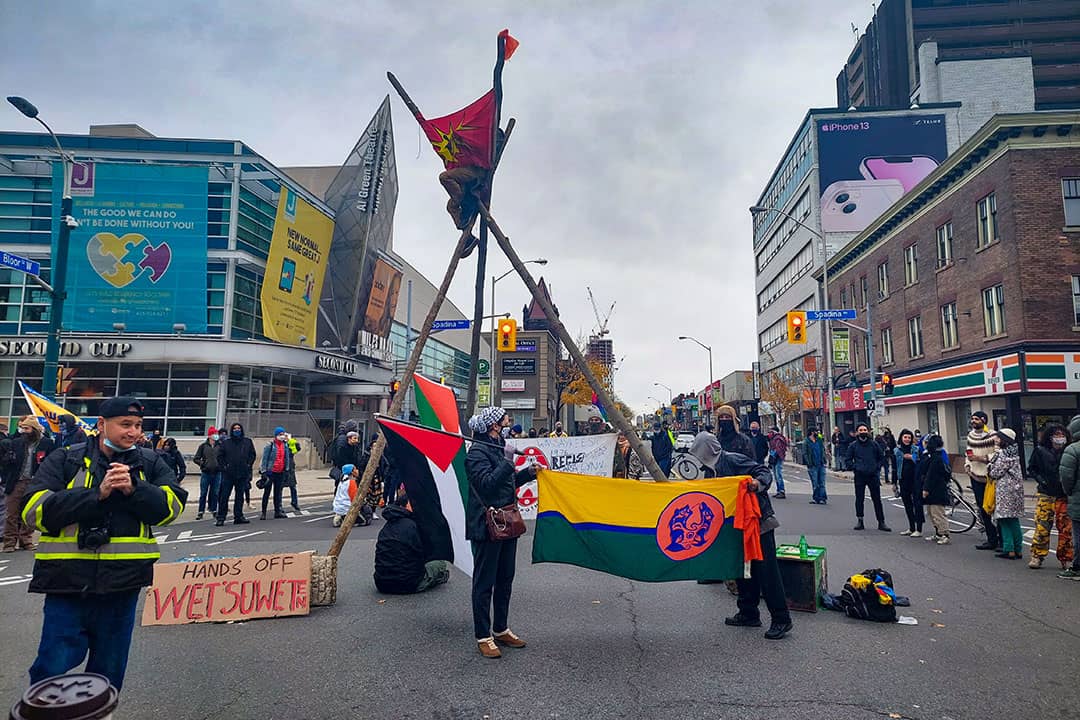The day I found out that the highways connecting the Lower Mainland of British Columbia to the rest of Canada had been swept away by catastrophic floods, I also received a notification alerting me that the Royal Canadian Mounted Police (RCMP) was once again occupying Wet’suwet’en territory in northern BC. The Wet’suwet’en people are not just defending their sacred lands from encroaching corporations and dangerous government overreach; Indigenous leaders have been warning us of the dire consequences of pipelines and other climate-unconscious industries for years.
This is not the first time that the RCMP has occupied this territory. In the last few years, the RCMP has launched three occupations of Wet’suwet’en territory, arresting people protesting against the Coastal GasLink pipeline. These occupations are not only heinous misuses of power against Indigenous land protectors, but also show BC Premier John Horgan and Prime Minister Justin Trudeau’s malicious apathy toward the rapidly approaching climate crisis.
British Columbia is no stranger to climate emergencies: every year, forest fires ravage the dry interior of the province, turning the sky brown and setting off air quality warnings. However, BC suffered an even larger variety of climate crises in 2021 than in past years. The heat dome in June killed nearly 600 people in British Columbia at a time when deaths by COVID-19 and drug overdose were also on the rise. This past year also had the third worst forest fire season on record, and we experienced torrential, flood-inducing rain and atmospheric rivers that even led to a waterspout developing by the Vancouver International Airport.
It is nearly impossible to overstate the effects the current flooding has had on my home province. Highways have been swept away, cutting off supply routes by road to Metro Vancouver, and causing shortages in everything from gas to groceries. At one point, the quickest route to the interior of BC by land was through Washington state. Entire townships were forced to evacuate as their wastewater pumps failed. The flood has caused property damage, mass homelessness, and the destruction of both livestock and crops. The province is still in a state of emergency, with rainfall levels at over 300 per cent of the normal levels since September.
However, despite the growing supply and infrastructure crises developing in the south of the province — especially the interior — the premier, prime minister, and RCMP seem to only be focused on the north, where land defenders are trying to protect Wet’suwet’en territory. Only four days after the flooding began, Wet’suwet’en land defenders once again saw their lands occupied by the RCMP, intent on clearing them off their traditional lands for Coastal GasLink’s pipeline, an order approved the same day the floods began.
Premier Horgan has a history of sending the RCMP to do his dirty work: aside from the Wet’suwet’en occupations, the RCMP has a history of using excessive force to deal with the Fairy Creek blockade, which is being led by Indigenous leaders to protect one of BC’s last old growth forests, which is at risk of being logged. Worse yet, the silenced Indigenous leaders seem to be the only ones who care about the climate crisis at hand, and they come from some of the communities hit hardest by the current weather crises and supply shortages.
Under normal circumstances, I would be angry — in this situation, I’m furious. As the cost of the flood reaches an estimated $7.5 billion in infrastructure damages and economic losses, I ask why the BC and federal governments are so intent on not only spending money to fight the Wet’suwet’en both in court and on their traditional lands, but also professing the pipeline’s necessity when it is clearly a hindrance. This is the ultimate display of politicians’ lack of care for the climate crisis. Empty words of condolence mean nothing when the government is content to protect pipelines over people, especially after Indigenous groups have repeatedly warned them for decades that our way of life is not sustainable only to have their protests steamrolled by the newest natural gas corporation.
One argument I often hear is that something has to pay for fixing the climate: Trudeau himself has professed that money gleaned from the pipelines running through BC will be used to fix the climate crisis. However, it looks like we’re already paying for the pipeline, in more ways than one. The Trans-Mountain pipeline has contributed to a $11.9 billion loss and hasn’t yet repaid a single cent of it amid a myriad of delays, and that’s ignoring the environmental damages it will inevitably cause. The Coastal GasLink pipeline is slated to cost more than $6.6 billion, with $42 million per year in maintenance after its completion. Meanwhile, the flood has already caused at least $450 million in damages. So why are we spending so much money to fix a problem that has already been siphoning our tax dollars for years?
The handling of this climate crisis sets a dangerous precedent. If self-professed ‘environmentally conscious’ leaders like Horgan and Trudeau — and even normally outspoken and now conspicuously silent ones like BC MP Jagmeet Singh — get out of this unscathed, other Canadian and international leaders will feel welcome to take the same apathetic path.
Right now, Toronto is relatively safe from climate disaster, but this won’t last forever. We have to hold our leaders accountable now, even when the problems feel distant. If there’s anything that BC has shown us, it’s that the climate crisis is here now — and if our leaders don’t care, we have to make enough noise until they do.
Piper Hays is a first-year humanities student at Victoria College.


